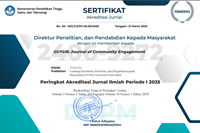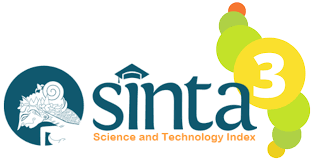Membangun Masyarakat Religius melalui Pembudayaan Amaliah Islam Nusantara pada Masyarakat Transisi
(1) * Ainul Yakin
 (Universitas Nurul Jadid Probolinggo)
(Universitas Nurul Jadid Probolinggo) Indonesia
(*) Corresponding Author
AbstractWisma Pengadengan Sejahtera (WPS) housing complex, Kebonagung, Kraksaan, Probolinggo is a relatively new residential complex. It was built in 2007. When it was built, the number of family heads (KK) living in the housing was 20 families. Over time, the housing of the FSW has grown faster and its occupants have become increasingly diverse. Until now, the number of households living in WPS housing is 260 households. WPS residents tend to be individualistic, rigid, there is a gap between one resident and another. Communication and communication opportunities between residents are relative, even among those who do not know each other. In addition, there are very few places of worship compared to the number of residents. So that the media to get to know each other and communication is increasingly limited. Residents of the WPS housing estate, who are migrants, can be said to be moving around. They experience a change from a society to an entirely new society. Among them are those who come from rural areas who have experienced a transition to urban habits, and have experienced a shift in their livelihoods from agricultural labor to the industrial and government sectors. On average they work at PLTU, IPMOMI Paiton, PT Sampoerna, Civil Servants and so on. Open access to roads and a relatively high educational background provides opportunities for change towards progress. But on the other hand, their professionalism covertly inhibits the sense of religion and solidarity among citizens. They can even say they are spiritually dry. So it requires a more religious, religious and friendly nuance of life. In the midst of such a complex community life, the solution offered by PKM in that environment is by forming recitation groups and religious activities with a participatory approach. PKM strives to build a religious society through the cultivation of the Islamic practices of the Archipelago, the construction of religious facilities and Islamic education. As a result, residents of the WPS housing program currently have three recitation groups, Madrasah Diniyah and three religious facilities. This cannot be separated from the cooperation and hard work of the citizens through the participatory approach in PKM.
|
Keywords
Transisi; Religius; Pembudayaan; Partipatoris; Perumahan WPS
Full Text: PDF
Refbacks
- There are currently no refbacks.
Copyright (c) 2021 Ainul Yakin

This work is licensed under a Creative Commons Attribution-ShareAlike 4.0 International License.
This journal is licensed under

Creative Commons Attribution-ShareAlike 4.0 International License.








.png)
